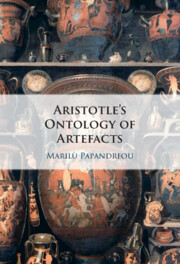Book contents
- Aristotle’s Ontology of Artefacts
- Aristotle’s Ontology of Artefacts
- Copyright page
- Dedication
- Contents
- Figures
- Acknowledgements
- Abbreviations
- Introduction
- Chapter 1 The Platonic Heritage
- Chapter 2 Using Artefacts against Plato
- Chapter 3 Aristotle’s Building Blocks in the Physics
- Chapter 4 Artefacts as Hylomorphic Compounds
- Chapter 5 Forms of Artefacts as Inert and Intermittent
- Chapter 6 The Relation between Matter and Form in Artefacts
- Chapter 7 The Relation Between Parts and Whole in Artefacts
- Chapter 8 The Physics and Metaphysics of Artefacts
- Conclusions
- Bibliography
- Index Locorum
- Subject Index
Chapter 6 - The Relation between Matter and Form in Artefacts
Published online by Cambridge University Press: 14 December 2023
- Aristotle’s Ontology of Artefacts
- Aristotle’s Ontology of Artefacts
- Copyright page
- Dedication
- Contents
- Figures
- Acknowledgements
- Abbreviations
- Introduction
- Chapter 1 The Platonic Heritage
- Chapter 2 Using Artefacts against Plato
- Chapter 3 Aristotle’s Building Blocks in the Physics
- Chapter 4 Artefacts as Hylomorphic Compounds
- Chapter 5 Forms of Artefacts as Inert and Intermittent
- Chapter 6 The Relation between Matter and Form in Artefacts
- Chapter 7 The Relation Between Parts and Whole in Artefacts
- Chapter 8 The Physics and Metaphysics of Artefacts
- Conclusions
- Bibliography
- Index Locorum
- Subject Index
Summary
Chapter 4 argues that those material objects that, in the Categories, would fall under the category of substance qualify as hylomorphic compounds (i.e. they have matter and form). It presents three arguments in defence of the thesis that artefacts have forms. The first argument is that artefacts undergo genuine unqualified coming-to-be (or substantial change), as opposed to the mere acquisition of a property by a substrate. Related to this argument is the crucial Aristotelian distinction between per se unity and accidental unity. The second argument is based on Aristotle’s application of the ekeininon-rule to artefacts, which reveals that the identity of an artificial object cannot be reduced to its matter. The third argument is that Aristotle’s application of the synonymy principle to artefacts shows that the form in the mind of the artisan is identical to the form present in the actual artefact, insofar as it is thought, and that the artisan’s use of tools represents the stage at which the artefact’s form is in potentiality.
- Type
- Chapter
- Information
- Aristotle's Ontology of Artefacts , pp. 181 - 218Publisher: Cambridge University PressPrint publication year: 2023

